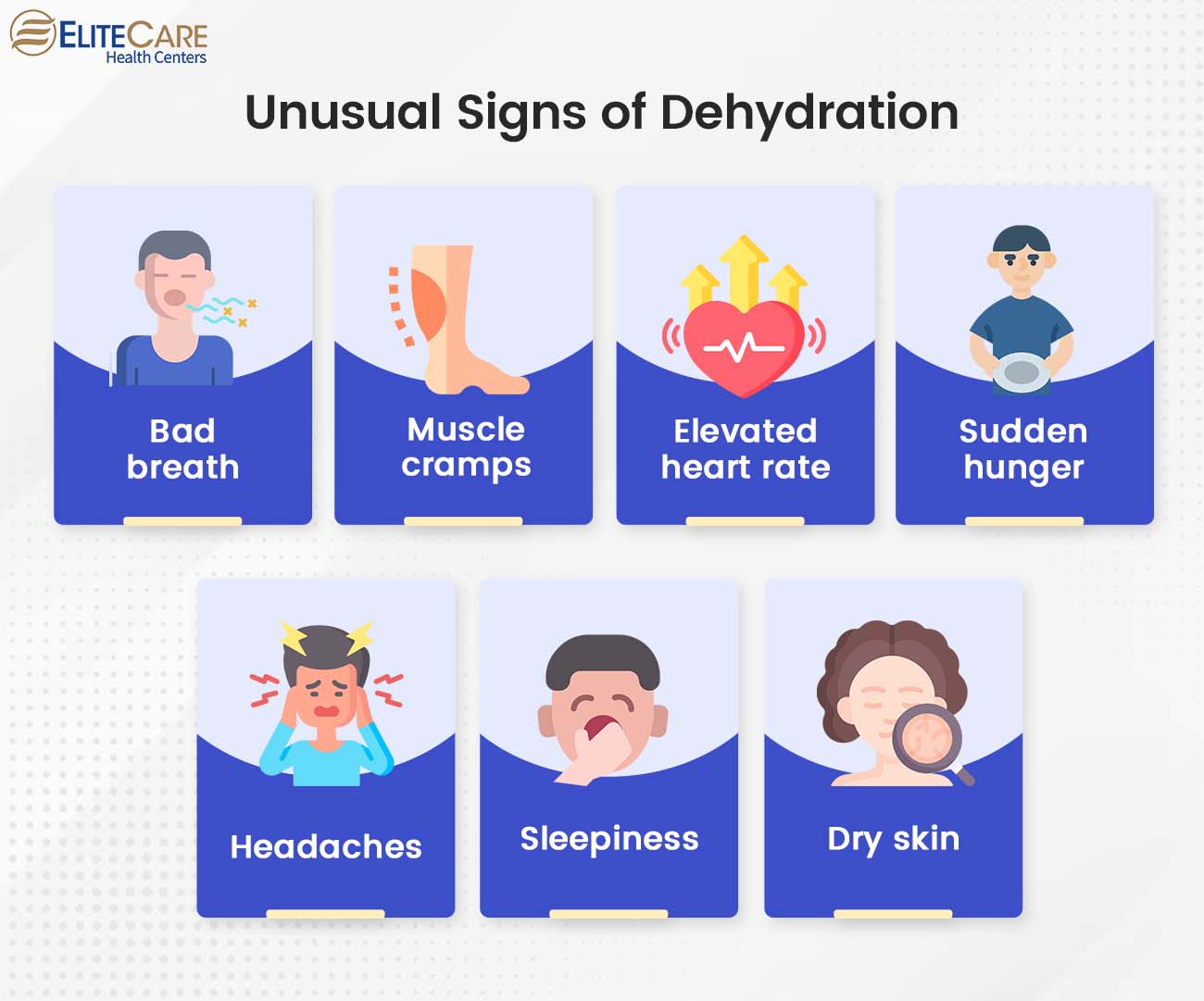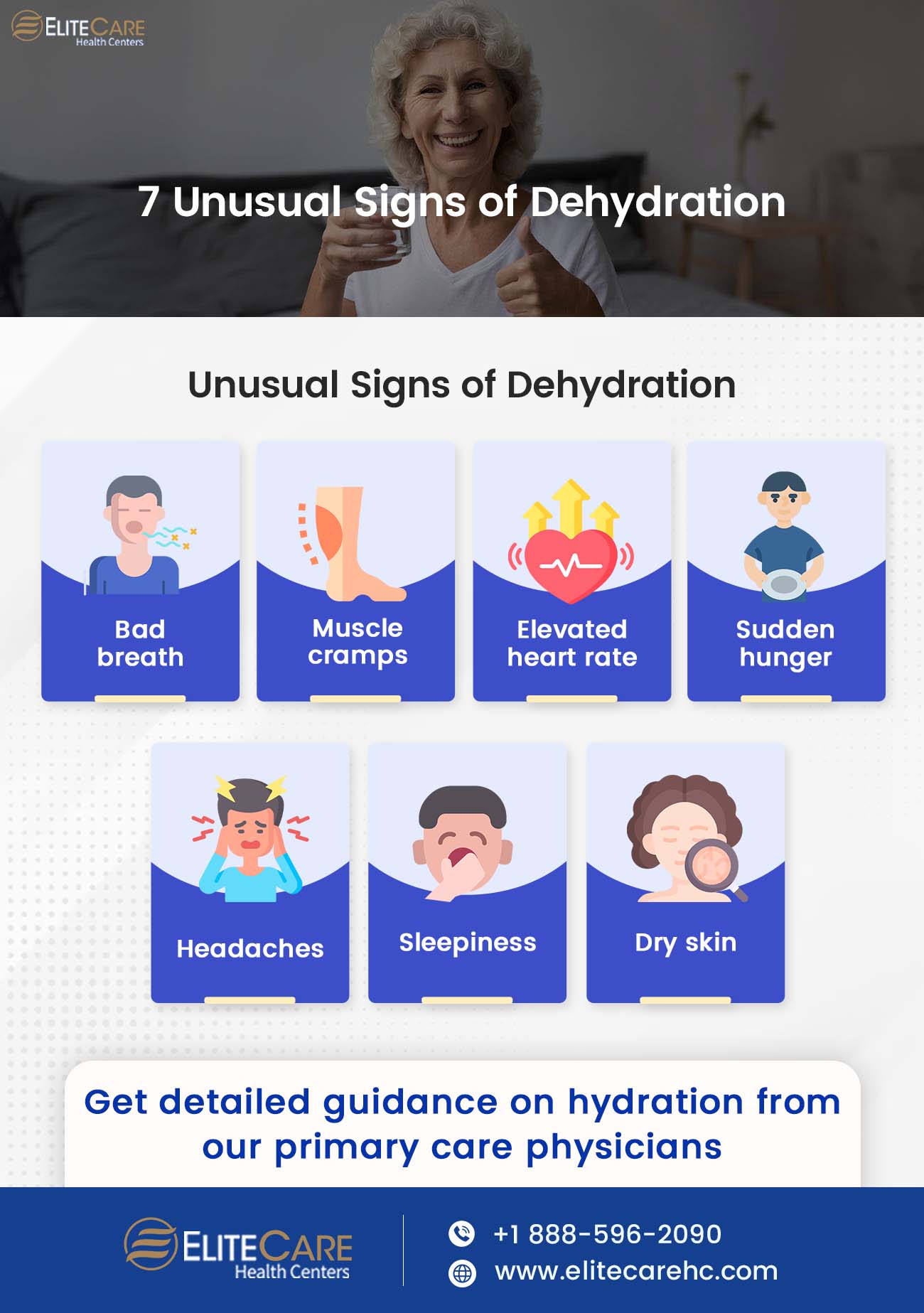
Dehydration occurs when our body loses more fluid than it takes in, leading to an imbalance in the body’s essential electrolytes and fluids. This disruption can occur due to several factors, including inadequate fluid intake, excessive sweating, vomiting, diarrhea, and certain medical conditions.
While symptoms like dry mouth, dark urine, and decreased urination can indicate dehydration, there are a few uncommon signs we often overlook. In this blog post, we will share detailed insights into a few lesser-known signs of dehydration that we must not ignore. Read on to learn more.
Thirst versus Dehydration
While thirst and dehydration are closely connected, they represent distinct states our body experiences in terms of fluid balance. Understanding the difference between them is essential for maintaining proper hydration.
The thirst is our body’s natural signal to increase fluid intake. It is a sensation prompted by our brain when the concentration of salts and other solutes in our blood rises slightly. This mechanism helps us to increase our fluid intake to prevent dehydration. This sensation is characterized by a dry mouth, an overall sense of dryness or discomfort, and lingering thoughts of drinking.
On the other hand, dehydration occurs when our body’s fluid loss surpasses fluid intake, and the body doesn’t have enough water to function properly. The common symptoms of dehydration are as follows:
- Dark yellow urine
- Decreased urination
- Fatigue
- Lightheadedness
- Sunken eyes
- Irritability of mood changes
If individuals wait until they feel thirsty to drink water, it might not always be sufficient, especially when they’re sweating heavily or performing intense physical activity. To prevent dehydration, drink water throughout the day, even when you are not thirsty.
7 Surprising Signs of Dehydration

In addition to common symptoms like increased thirst, dark urine, and fatigue, there are some lesser-known signs of dehydration that most of us often ignore. The following are a few unusual signs that could indicate the possibility of dehydration.
1. Bad breath or halitosis
When our body is dehydrated, it produces less saliva, which plays a vital role in rinsing away food particles and neutralizing acids produced by bacteria in the mouth. Limited saliva production can create an environment where bacteria thrive, leading to bad breath.
2. Muscle spasms or cramps
Lack of adequate hydration can disrupt the balance of electrolytes in the body, particularly sodium, potassium, and magnesium. These minerals are responsible for regulating muscle function.
Dehydration can cause electrolyte imbalance in the bloodstream. As a result, muscles can contract involuntarily, resulting in cramps and spasms.
3. Sleepiness or dizziness
When our body lacks hydration, it can lead to a decrease in blood volume. These changes in blood volume affect blood flow and oxygen delivery to tissues and organs. Due to this reduction in oxygen supply, dehydration can cause feelings of fatigue and sleepiness.
Individuals often yawn more and get tired easily when they are dehydrated.
4. Dry skin
Skin cells require proper hydration to function optimally. Dehydration can interfere with moisture levels, leading to dry, flaky, and even itchy skin. It reduces skin elasticity and bounciness.
Additionally, dehydration can also compromise the protective barrier against external irritants, causing rashes, irritation, etc.
5. Sudden hunger
The brain’s hypothalamus controls both hunger and thirst sensations. Sometimes, the brain can misinterpret dehydration as hunger, leading to sudden cravings for food, particularly sweet or salty options. If an individual is dehydrated, their body requires a quick energy source, which is also mistakenly perceived as hunger.
6. Headaches
Dehydration can impact blood volume and pressure. Therefore, when blood volume decreases because of dehydration, the brain may temporarily contract or shrink slightly due to fluid loss. This process can trigger pain receptors, eventually leading to headaches.
Additionally, blood vessels in the brain may widen in response to dehydration, further contributing to headaches.
7. Elevated heart rate
As blood volume decreases due to dehydration, the heart pumps faster to compensate for the limited amount of fluid and maintain proper blood circulation. As a result, individuals may experience elevated heart rates or feelings of palpitation.
Identifying these unusual signs of dehydration is essential for addressing the issue before it worsens. To prevent and counteract dehydration, focus on consistent hydration by drinking water throughout the day and increasing overall fluid intake, especially in hot weather or during physical activity. For any queries or concerns about dehydration, consult a primary care physician or a registered dietitian at the earliest.
How Much Water is Sufficient to Prevent Dehydration?
According to researchers, an estimated daily water intake should be around 15.5 cups for men and 11.5 cups for women. However, determining the ideal fluid intake varies for every individual, depending on a few factors, including:
- Activity level
- Weather conditions and outdoor temperature
- Specific health conditions (e.g., thyroid disorders, kidney or liver issues, or heart ailments)
- Certain medications (e.g., NSAIDs, opiate pain relievers, and select antidepressants)
- Age (particularly those aged 60+)
- Additional food and fluid intake
To calculate their daily water requirements, individuals should consult primary care physicians and follow their guidance.
When to See a Doctor
Healthcare professionals classify dehydration into different levels:
Mild dehydration
At this level, increasing oral fluid intake is usually sufficient. In cases of excessive sweating or fluid loss due to vomiting and diarrhea, consider an electrolyte drink. In this situation, individuals usually notice improvement within five to ten minutes.
Moderate dehydration
Intravenous (IV) fluid administration is necessary for moderate dehydration. Primary care physicians and healthcare professionals administer this procedure in urgent care medical clinics, emergency rooms, or hospitals.
Severe dehydration
If an individual notices severe dehydration symptoms, it’s crucial to seek immediate medical attention. Contact 911, or local emergency services, or visit the nearest healthcare centers, medical clinics, or emergency rooms.
Consult a primary care physician in case of any queries or concerns about dehydration. At EliteCare Health Centers in Florida, you can schedule an appointment with some of the best board-certified primary care physicians. Contact your nearest EliteCare healthcare center to determine the extent of your dehydration and receive the appropriate treatment. Our medical clinics are well-equipped to provide state-of-the-art senior care services, including preventive care, vaccination, routine physical exams, etc.






